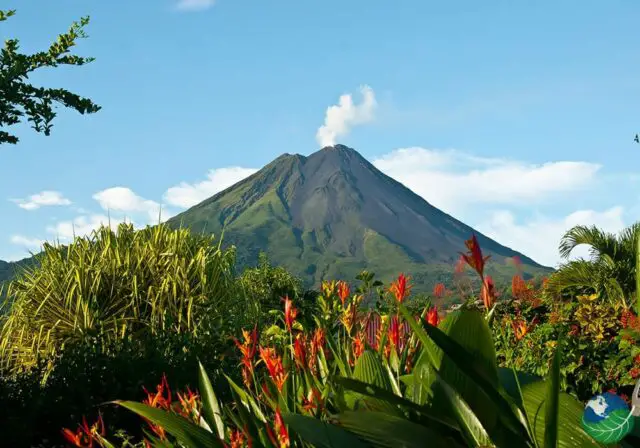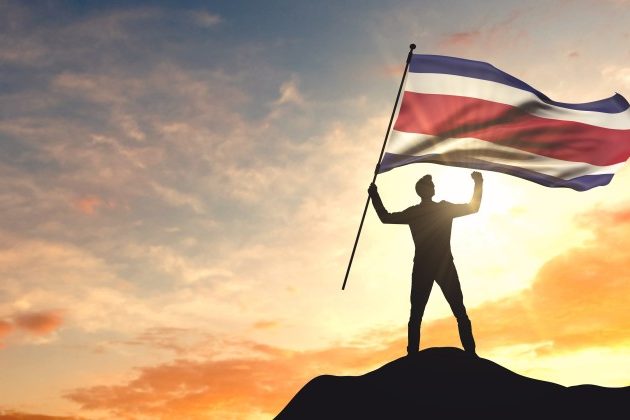Costa Rica is an impressive country, where nature reigns in every corner. In addition to a privileged natural environment, its inhabitants have a very characteristic lifestyle that always places Costa Rica as one of the happiest countries in the world. We tell you 25 curiosities of Costa Rica so that you know in depth the secrets of this great country.
1. Why are its inhabitants called ‘Ticos’?
The story comes from afar. In 1856 and 1857 Costa Rica was stalked by the army of filibuster pirates who wanted to storm the coast. Costa Rica had the help of soldiers from other neighboring countries, who realized that Costa Rican combatants used the diminutive -ico, -ica (chiquitico, for example) a lot. In addition, they affectionately addressed their compatriots calling them siblings. With time and continued use, the inhabitants of the country became Ticos and Ticas.
2. Tiquicia: An affectionate nickname
The thing with the Ticos does not stop there, but that nickname spread throughout the country. Costa Rica is also affectionately known as Tiquicia, the land of the Ticos.
3. Penicillin has Tico origin: One of the most unknown curiosities of Costa Rica
Surely you have always heard that Alexander Fleming was the one who discovered the properties of penicillin. But in Costa Rica they disagree. The Costa Rican doctor Clodomiro Picado (nicknamed “Clorito”) was his predecessor publishing a report on the effects of penicillin on his patients in 1927, a year before Fleming patented the discovery. Chlorite notified the Paris Academy of Sciences of the discovery of him before Fleming, but it was not recognized.
4. Ticos take education very seriously
Costa Rica has a literacy rate of almost 98%. A high figure compared to neighboring countries and taking into account that there are many rural areas. But no one forgets the children who live in remote areas. There are many single teacher schools spread across the country so that all ticos can attend class. It is one of the curiosities of Costa Rica to be most proud of.
5. Pura Vida!
One of the most famous curiosities of Costa Rica is the use of the expression “Pura Vida”. Before visiting the country, it probably sounds like a cliché. But once there, it is true that you hear “Pura Vida” at all hours: as a greeting, farewell, as a “how are you?”, as a phrase of encouragement, to celebrate a victory… So anything goes to exclaim Pura Vida!
6. Coffee is a national icon

Despite being a small country, Costa Rica is the 13th largest coffee exporter in the world. The first coffee beans arrived from Jamaica in 1779. They were baptized as golden beans, since thousands of kilometers of plantations made the coffee industry the main source of income for the country until tourism overtook it in 1991. Beyond economic indicators, drinking coffee is a ritual in every home in Costa Rica. It is taken at all hours and even the smallest of the house.
7. Do you fancy a ‘café chorreado’ (spilled coffee)?
One of the curiosities of Costa Rica that surprised us the most was the traditional way of preparing coffee. They offered us drizzled coffee and we had no idea what it was, but we wanted to try it. The waiter came to the table with a wooden artifact with a bag full of coffee hanging down. The cup is placed under the bag and boiling water is poured over the bag, so that the coffee “drips” into the cup. Like many traditions, it is being lost and each time they serve ‘chorreado’ coffee in fewer places. Do not miss the opportunity to try it! It has a slightly more intense flavor than machine coffee.
8. A small country full of life: One of the best curiosities of Costa Rica
Costa Rica only occupies 0.03% of the earth’s surface, but 4% of the known animal and plant species live in that small space. That makes it one of the most biodiverse countries in the world.
9. 25% of the territory is protected
Despite being a small territory, a quarter of the country’s surface is considered as national parks and, therefore, fully protected against possible destruction.
10. Recreational hunting is prohibited

To show the great respect that Costa Ricans have for animals, the government banned hunting as a recreational activity in 2012. It is one of the curiosities of Costa Rica that shows that they love nature.
11. Do you know the ‘mentiriólogo’? One of the funniest curiosities of Costa Rica
As soon as we arrived in the country, we spent the first days constantly looking at the weather forecasts. The gray sky was threatening and we did not want the rain to spoil our plans. But it was not long before we realized that there was no use looking at what the meteorologists were saying. Being located between two oceans and having many mountainous areas in such a small territory, the climate of Costa Rica is absolutely unpredictable. For this reason, meteorologists rarely get one single right forecast and have earned the nickname of mentiriólogos (lying metereologists).
12. There are a thousand ways to call the rain
Just as the Eskimos have different words to differentiate between 30 shades of white, in Costa Rica rain is called in many ways. It is a very rainy country, so it has the largest rivers in the world behind those of New Zealand. When it rains very little, it is called ‘cat hair’ or ‘garúa’. On the other hand, when the rain is intense, we speak of a bucket, downpour or storm. Another way of calling rain, especially in the Caribbean, is ‘guata’ (from water).
13. The Volcanoes: Protagonists of several curiosities of Costa Rica

There are about 200 volcanic formations in the country, half active. The most famous volcano is the Arenal. It is also one of the most active in the world. Fortunately, since 1968 there have been no dangerous eruptions. However, with so many volcanoes, the land in Costa Rica is alive: the Costa Rica Volcanological and Seismological Observatory records several tremors every day.
14. The largest lake in the country is artificial
One of the most unusual curiosities of Costa Rica: Lake Arenal is the largest in the country and it is artificial! It is at the foot of the Arenal volcano and is a great center for recreational water sports.
15. The sun rises and sets at the same time every day
Being so close to the equator, in Costa Rica sunrises and sunsets throughout the year are practically the same time.
16. Take into account the Tica time
We are not referring to any advance of the hour! The safest thing is that if you set an appointment with a Tico for a specific hour, he will show up a little later. This delay is part of the culture of the country and is known as the Tica hour.
17. The ‘pipa fría’ (cold pipe) is the remedy for all ills
There is nothing more palatable than lying on a Costa Rican beach with a cold pipe in hand. The young green coconut is called a pipe, which has a very rich water inside. This liquid is very nutritious thanks to the potassium and the large amount of antioxidants it contains. It also has isotonic properties and is ideal for preventing dehydration. For all this, during the Second World War coconut water was used as a plasma substitute for emergency blood transfers.
18. It does not have an army: One of the most famous curiosities of Costa Rica
Costa Rica is one of the few countries in the world that does not have an army, along with Andorra, Iceland, Mauritius or Monaco, for example. The army was abolished on December 1, 1948 after a Civil War. The then President said: “I don’t want an army of soldiers, but of educators.” Since then, there is no permanent armed organization but it is allowed to form military forces to maintain order or by international agreement.
19. The most remote part of Costa Rica is also one of the most famous
Have you ever heard of Isla del Coco? It is an island in the Pacific 600 kilometers from the mainland. It is totally uninhabited despite being large enough (12 × 5 kilometers). Maybe saying it like that doesn’t sound like anything to you. But, what if we told you that the beginning of the movie Jurassic Park was filmed there? Millions of people have virtually visited Isla del Coco without knowing it, one of Costa Rica’s most artistic curiosities.
20. Escazú, a mysterious district
One of the most mysterious curiosities of Costa Rica is the presence of witches in the district of Escazú. Currently it is one of the richest areas of San José, but in the past there were secret caves in the mountain where women with supernatural powers predicted the future or even made curses.

21. Knowing Spanish is not enough to understand everything in Costa Rica
Another of the curiosities of Costa Rica is the amount of their own words they use. The street slang is called “pachuco” and the truth is that it seems a totally different language from Spanish. “Bretear” means to work, “mae” is equivalent to uncle in Spain or “tuanis” is used when something is cool. Other words that seemed curious to us was to call the gas station a “bomba” or a traffic jam “presa”.
22. It became fashionable to say the words backwards
Continuing with the curiosities of Costa Rica related to language, in the 90s it became fashionable to speak with the syllables backwards or by exchanging some letters. According to what we were told, it was used especially among teenagers to do illegal activities without raising suspicions from the police. For example, primo (cousin) became “mopri” or trabajo (work) became “jotraba”.
23. You must be very careful trying not to get lost
The vast majority of streets in Costa Rica have no name. To get to a specific point, you will have to follow indications of the style: 100 meters to the left of the church, next to the park. Obviously, if you decide to rent a car in Costa Rica, it is essential to have a GPS to help you find your way around.
24. Costa Rica is not a country for pedestrians
We fell in love with Costa Rica, but we do not recommend visiting the country with the idea of walking or cycling. The roads are designed for cars and pedestrians do not have many rights.
25. You cannot enter San José by car according to the license plate numbers
Traffic is a big problem throughout the country, but especially in the capital. To avoid the collapse in the streets of San José a very curious measure was adopted. Each day of the week from Monday to Friday access by car to the city is prohibited according to the last number of the vehicle registration. For example, if your plate ends in 1 or 2, you will not be able to enter San José on Mondays; on 3 or 4 on Tuesdays and so on.

